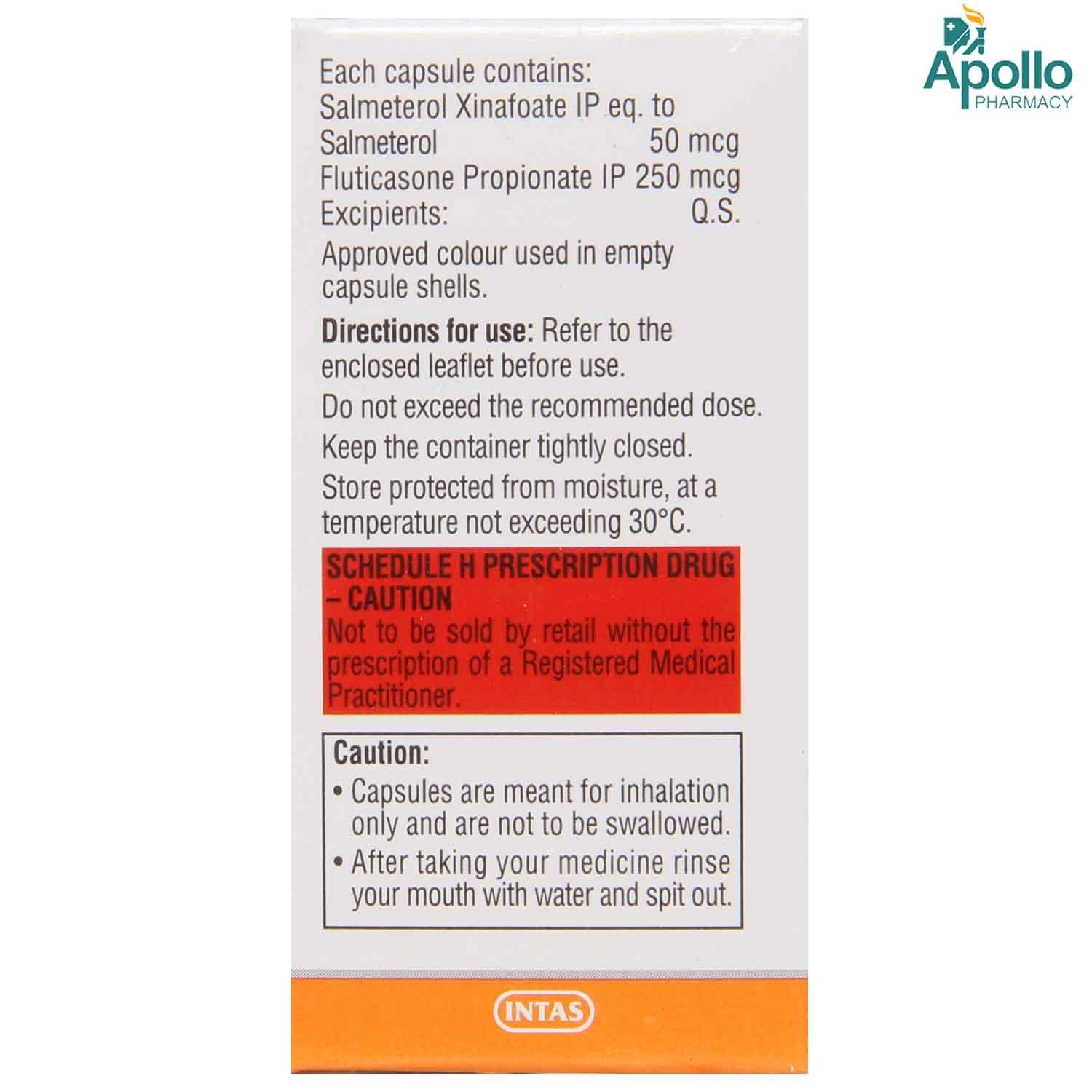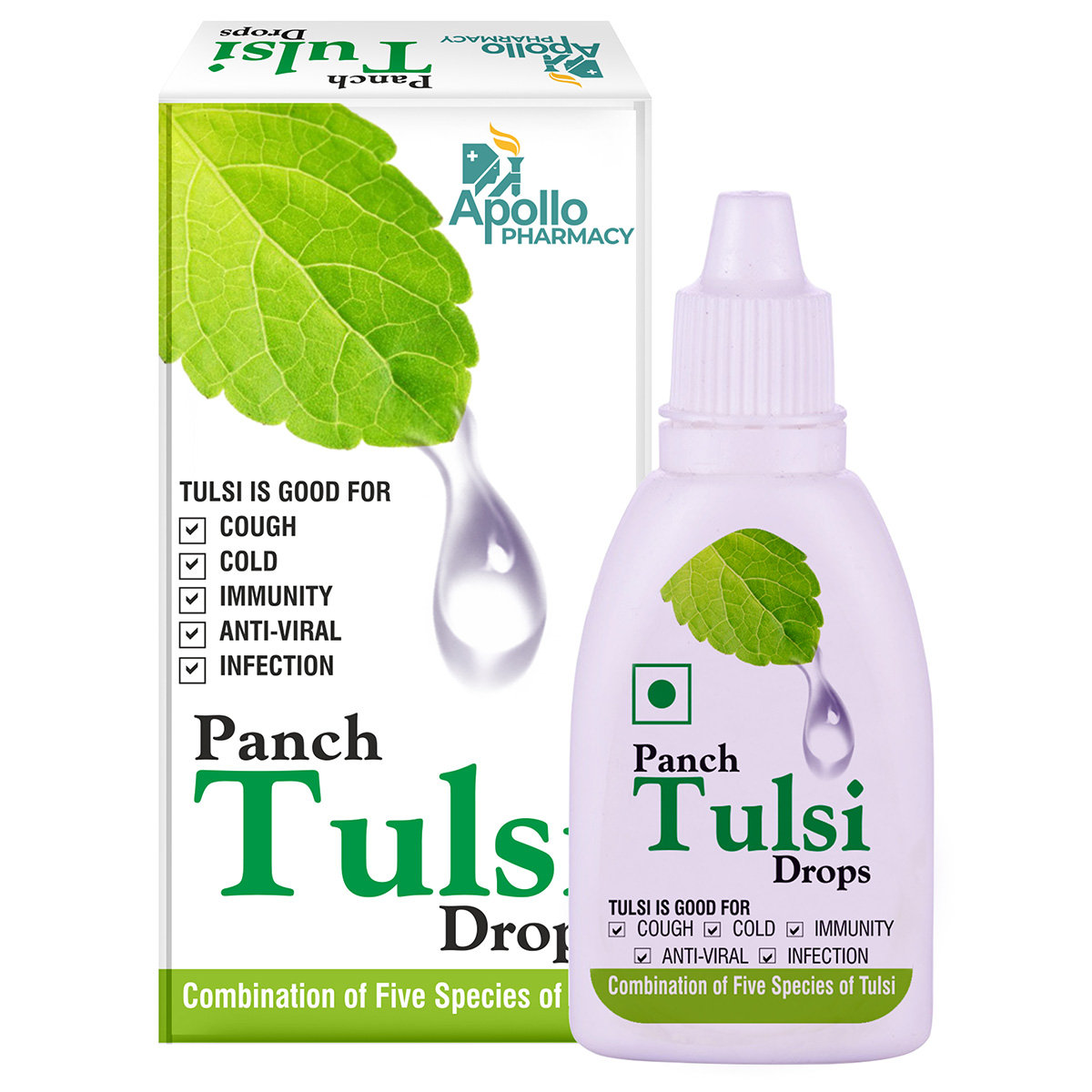Quikhale SF 250 Capsule 30's



MRP ₹495.5
(Inclusive of all Taxes)
₹74.3 Cashback (15%)
Quikhale SF 250 Capsule is used to treat and prevent respiratory disorders, such as asthma attacks and chronic obstructive pulmonary disease (COPD). It contains Salmeterol and Fluticasone, which relax the muscles in the airways and increase airflow to the lungs. It makes breathing easier by widening the airways. It may cause common side effects such as nausea, vomiting, respiratory tract infection, headache, sore throat, cough, bone, muscle or joint pain, increased heart rate, chills, black or tarry stools, and noisy breathing. Before taking this medicine, you should tell your doctor if you are allergic to any of its components or if you are pregnant/breastfeeding.
Know Your Delivery Time
Provide Delivery Location

Secure Payment

India's Most Trusted Pharmacy

Genuine Products
Composition :
Manufacturer/Marketer :
Consume Type :
Return Policy :
Expires on or after :
About Quikhale SF 250 Capsule
Quikhale SF 250 Capsule is used to treat and prevent asthma and chronic obstructive pulmonary disease (COPD). Asthma is a breathing disorder characterised by airway narrowing, swelling, and excessive mucus production, resulting in difficulty breathing. COPD is a group of lung diseases that includes emphysema (shortness of breath) and chronic bronchitis (inflammation of the lining of the bronchial tubes).
Quikhale SF 250 Capsule contains Salmeterol and Fluticasone. Salmeterol relaxes the muscles in the airways, increasing airflow to the lungs. Fluticasone acts by blocking the production of prostaglandins (chemical messengers) that cause inflammation (swelling) of the airways.
The common side effects of Quikhale SF 250 Capsule include nausea, vomiting, respiratory tract infection, headache, sore throat, cough, bone, muscle or joint pain, increased heart rate, chills, black or tarry stools, and noisy breathing, which gradually resolve over time. However, if the side effects are persistent, reach out to your doctor.
Try not to stop taking this medicine on your own. Therapy with nasal or inhaled corticosteroids like Fluticasone should be cautiously administered in patients with a fungal, bacterial, parasitic, or viral infection and tuberculosis, since there is a chance of developing a secondary infection. Please check with your doctor if you are pregnant, currently breastfeeding, or taking any other prescribed or non-prescribed medicines.
Uses of Quikhale SF 250 Capsule
Quikhale SF 250 Capsule is used to treat and prevent breathing problems associated with asthma and chronic obstructive pulmonary disease (COPD). The detailed uses of Quikhale SF 250 Capsule are as follows:
- Treatment of asthma: Used to relieve and prevent difficulty breathing, wheezing, shortness of breath, coughing, and chest tightness in people with asthma.
- Management of chronic obstructive pulmonary disease (COPD): Quikhale SF 250 Capsule controls and minimises symptoms such as wheezing, dyspnea, coughing, and chest tightness in patients with COPD, including chronic bronchitis and emphysema.
- Control of COPD flare-ups: Reduces the frequency and severity of COPD exacerbations while improving overall lung function.
- Anti-inflammatory effect: Fluticasone reduces airway irritation, which makes breathing easier.
- Long-acting bronchodilation: Salmeterol relaxes the airway muscles, helping breathing become easier over time.

Have a query?
Directions for Use
- Follow your doctor's instructions on the dosage and timing of this medication to ensure safe and effective use.
- Please read the instruction leaflet and use it as suggested by your doctor.
- Rinse your mouth with water and spit it out after using Quikhale SF 250 Capsule to avoid fungal infections in the mouth and throat.
Medicinal Benefits
- Quikhale SF 250 Capsule is used to treat and prevent respiratory disorders, such as asthma attacks and chronic obstructive pulmonary disease (COPD).
- Quikhale SF 250 Capsule improves pulmonary function and effectively treats and prevents the worsening of emphysema (shortness of breath) and chronic bronchitis (inflammation of the lining of your bronchial tubes).
- Quikhale SF 250 Capsule is a combination of Salmeterol (bronchodilator) and Fluticasone (corticosteroid). Salmeterol relaxes the muscles in the airways, increasing airflow to the lungs.
- It makes breathing easier by widening the airways.
- Fluticasone acts by blocking the production of prostaglandins (chemical messengers) that cause inflammation (swelling) of the airways.
- Fluticasone has potent vasoconstrictive (narrowing of the blood vessels) and anti-inflammatory activity.
How Quikhale SF 250 Capsule Works
Storage
- Inform your doctor about the symptoms you're experiencing due to medication.
- Your doctor may adjust your treatment plan, which could include changing your medication, adding new medications, or offering advice on managing your symptoms.
- Practice good hygiene, including frequent handwashing, avoiding close contact with others, and avoiding sharing utensils or personal items.
- Stay hydrated by drinking plenty of fluids to help loosen and clear mucus from your nose, throat, and airways.
- Get plenty of rest and engage in stress-reducing activities to help your body recover. If your symptoms don't subside or worsen, consult your doctor for further guidance.
- Drink warm fluids such as warm water with honey, broth, soup or herbal tea to soothe sore throat.
- Gargle with warm salt water.
- Suck on lozenges to increase the production of saliva and soothe your throat.
- Use a humidifier to soothe sore throat as it adds moisture to the air and makes breathing easier.
- Limit sugary drinks and foods to reduce yeast growth.
- Avoid yeast-rich foods like beer, wine, and sourdough bread.
- Include probiotic-rich foods like yogurt, kefir, kimchi, and sauerkraut.
- Eat antifungal foods like garlic, onions, cinnamon, and coconut oil.
- Focus on nutrient-rich foods high in vitamins C and E.
- Use a warm saltwater rinse in your mouth several times daily.
- Practice excellent oral hygiene through regular brushing, flossing, and denture cleaning.
- Stay hydrated by drinking plenty of water.
- To manage stress, try relaxation methods like deep breathing exercises, meditation, or yoga to help calm your mind and body.
- Avoid smoking and tobacco to prevent immune function impairment.
- Consult a doctor for proper diagnosis and treatment.
- If you experience symptoms like coughing, wheezing, chest tightness, or difficulty breathing after taking medication, seek medical attention immediately.
- Your healthcare provider will work with you to stop the medication causing the reaction, start alternative treatments, and provide supportive therapy.
- To manage symptoms and prevent complications, follow your doctor's advice to use inhalers or nebulizers as prescribed, practice good hygiene, avoid irritants, stay hydrated, and get plenty of rest.
- Regularly track your symptoms and report any changes or concerns to your healthcare provider.
- Tell your doctor about the cough symptoms you're experiencing, which may be triggered by your medication.
- Your doctor may adjust your treatment plan by changing your medication, adding new medications, or providing guidance on managing your cough symptoms.
- Practice good hygiene, including frequent handwashing, avoiding close contact with others, and avoiding sharing utensils or personal items.
- Stay hydrated by drinking plenty of fluids, such as water, tea, or soup, to help thin out mucus and soothe your throat.
- Get plenty of rest and engage in stress-reducing activities to help your body recover. If your cough persists or worsens, consult your doctor for further guidance.
What if I have taken an overdose of Quikhale SF 250 Capsule
Drug Warnings
- Do not stop taking this medicine on your own unless advised by your doctor.
- Before taking Quikhale SF 250 Capsule , let your doctor know if you have a history of heart, liver, kidney diseases, hyperadrenocorticism (high levels of cortisol), eye disorders like cataracts and glaucoma, seizure (fits), osteoporosis (weak and brittle bones), and diabetes.
- Quikhale SF 250 Capsule may cause hypokalemia (low potassium levels in the blood); therefore, it should be used with caution in patients with hypokalemia to prevent any cardiovascular effects.
- Special precautions should be taken in patients with a fungal, bacterial, parasitic, or viral infection and tuberculosis, since nasal or inhaled corticosteroids like Fluticasone can cause secondary infections.
- Quikhale SF 250 Capsule can cause a rise in blood glucose levels. Hence, monitor your blood glucose levels regularly if you are diabetic.
- Please let your doctor know if you plan to become pregnant or are already pregnant and a lactating mother.
- Do not drive or operate machinery if you experience drowsiness and increased/uneven heart rate while using Quikhale SF 250 Capsule .
- Avoid drinking alcohol while taking this medicine, as it can worsen your side effects.
Drug-Drug Interactions
Drug-Drug Interactions
Login/Sign Up
Drug-Food Interactions
Drug-Food Interactions
Login/Sign Up
Diet & Lifestyle Advise
- Take the medication as directed by the doctor and at regular intervals. Do not use other over-the-counter medications, herbal or vitamin supplements without informing your pharmacist or doctor when you take Quikhale SF 250 Capsule .
- Know your triggers, such as allergens, such as pollen, dust, and food items, that make your asthma severe.
- Quit smoking and avoid passive smoking. Smoking also reduces the effectiveness of the medicine.
- Eat a healthy diet and exercise regularly to strengthen your breathing muscles and boost your immune system.
- Learning breathing exercises will help you move more air in and out of your lungs.
Habit Forming
Therapeutic Class
All Substitutes & Brand Comparisons
RX
Rheoran SF 250 Octacaps 30's
Sun Pharmaceutical Industries Ltd
₹220
(₹6.6 per unit)
55% CHEAPERRX
Zormist-SF-250 Zorcap Capsule 30's
Medzor Pharmaceuticals
₹260
(₹8.67 per unit)
41% CHEAPERRX
Ibiflo-S 250 Nexcaps 30's
Indiabulls Pharmaceuticals Pvt Ltd
₹299
(₹8.97 per unit)
39% CHEAPER
Alcohol
Unsafe
Avoid drinking alcohol while taking this medicine as it can worsen your side effects.
Pregnancy
Consult your doctor
Please consult your doctor if you are planning to conceive or are already pregnant before starting Quikhale SF 250 Capsule .
Breast Feeding
Consult your doctor
There is limited data on how Quikhale SF 250 Capsule affects breastfeeding. Please consult your doctor before starting Quikhale SF 250 Capsule .
Driving
Caution
Do not drive or operate machinery if you experience drowsiness and an increased or uneven heart rate while using Quikhale SF 250 Capsule . This may affect your ability to drive. Seek medical attention if the symptoms persist longer.
Liver
Caution
The use of Quikhale SF 250 Capsule should be exercised with caution in patients with liver disease. Let your doctor know if you have any history of liver disease or hepatic impairment. Your doctor will weigh the benefits and potential risks before prescribing Quikhale SF 250 Capsule .
Kidney
Caution
Quikhale SF 250 Capsule should be used with caution in patients with kidney diseases. Inform your doctor if you have a history of kidney disease. Your doctor will weigh the benefits and potential risks before prescribing Quikhale SF 250 Capsule .
Children
Caution
Quikhale SF 250 Capsule is not recommended for use for children less than four years of age. The dose may have to be adjusted by your doctor depending upon the condition of the child's disease and age.
Heart
Consult your doctor
Please inform your doctor if you have a history of heart disease before using Quikhale SF 250 Capsule . Your doctor will prescribe it only if the benefits outweigh the risks.
Geriatrics
Caution
Quikhale SF 250 Capsule should be used in elderly patients only when prescribed by a doctor. If you have any concerns about using Quikhale SF 250 Capsule in older adults, please consult your doctor.
FAQs
Quikhale SF 250 Capsule is used to treat and prevent respiratory disorders like asthma and chronic obstructive pulmonary disease (COPD).
Quikhale SF 250 Capsule consists of Salmeterol (bronchodilator) and Fluticasone (Fluticasone). Salmeterol relaxes the muscles in the airways, increasing airflow to the lungs. Fluticasone acts by blocking the production of prostaglandins (chemical messengers) that cause inflammation (swelling) of the airways.
Quikhale SF 250 Capsule should be cautiously administered under the doctor's guidance in seizures since bronchodilators like Salmeterol can cause central nervous system stimulation that can lead to other adverse conditions. Please consult your doctor before using Quikhale SF 250 Capsule if you have seizures.
Quikhale SF 250 Capsule contains bronchodilator (Fluticasone), which can cause a rise in blood glucose levels. Hence, therapy with Quikhale SF 250 Capsule is cautiously administered in patients with diabetes. Please monitor your blood glucose levels regularly and inform your doctor so that the dose can be adjusted accordingly.
Bronchodilator (Salmeterol) in Quikhale SF 250 Capsule may decrease the potassium levels in your body; therefore, it should be used with caution. Please consult your doctor before taking Quikhale SF 250 Capsule since low potassium levels can lead to other cardiovascular problems in patients with hypokalemia.
Take the missed dose as soon as possible. However, if it is time for the next dose, skip the missed dose and go back to your regular dosing schedule.
Quikhale SF 250 Capsule is a combination medication used to treat and prevent respiratory disorders, such as asthma and chronic obstructive pulmonary disease (COPD). It contains two active ingredients: Salmeterol and Fluticasone Propionate.
Quikhale SF 250 Capsule is a controller medication. It manages and prevents symptoms of asthma and chronic obstructive pulmonary disease (COPD) by keeping the airways open and reducing inflammation. It should be used regularly to be effective, and not to relieve sudden asthma attacks immediately.
Quikhale SF 250 Capsule contains a Fluticasone Propionate, which belongs to the family of medicines known as corticosteroids or steroids (cortisone-like medicines), which helps reduce inflammation in the airways.
Yes, Quikhale SF 250 Capsule may increase heart rate due to the Salmeterol component, which is a long-acting beta2-adrenergic receptor agonist (LABA). This can lead to palpitations, tremors, and increased heart rate in some individuals. Try deep breathing exercises, relaxation techniques, staying hydrated, and avoiding caffeine and nicotine to manage an increased heart rate. If the increased heart rate persists or worsens, consult your healthcare provider for guidance.
Quikhale SF 250 Capsule may cause some common side effects, including nausea, vomiting, respiratory tract infection, headache, sore throat, cough, bone, muscle, or joint pain, increased heart rate, chills, black or tarry stools, and noisy breathing. Most of these side effects of Quikhale SF 250 Capsule do not require medical attention and typically resolve on their own over time. However, if the side effects persist, contact your doctor.
Quikhale SF 250 Capsule is not addictive. It is a very effective and useful medication for people suffering from breathing difficulties due to asthma and COPD.
Taking Quikhale SF 250 Capsule more frequently than prescribed will not make it more effective and can increase the risk of side effects. It is essential to use this medication exactly as directed by your doctor to manage your asthma or COPD effectively.
When using Quikhale SF 250 Capsule , following certain precautions is essential to ensure safe and effective use. Follow your doctor's instructions, and do not use it for sudden asthma attacks. Instead, use a rescue inhaler as your doctor advises. Additionally, rinse your mouth with water after inhaling to prevent fungal infections. Avoid asthma triggers, such as dust, pollen, or smoke, and store the inhaler correctly, out of the reach of children, pets, and extreme temperatures. Inform your doctor about other medications, supplements, or vitamins you're taking, and regularly monitor for side effects, such as increased heart rate, tremors, or mood changes.
Quikhale SF 250 Capsule should be stored below 30°C and kept away from moisture. Keep out of the reach of children. Always follow the storage instructions provided on the packaging or by your healthcare provider.
Country of origin
Manufacturer/Marketer address
Customers Also Bought
Disclaimer
Author Details
We provide you with authentic, trustworthy and relevant information
Buy best Respiratory System products by
Cipla Ltd
Glenmark Pharmaceuticals Ltd
Lupin Ltd
Alkem Laboratories Ltd
Sun Pharmaceutical Industries Ltd
Mankind Pharma Pvt Ltd
Macleods Pharmaceuticals Ltd
Zydus Healthcare Ltd
Leeford Healthcare Ltd
Dr Reddy's Laboratories Ltd
Zydus Cadila
Pristine Pearl Pharma Pvt Ltd
Abbott India Ltd
Intas Pharmaceuticals Ltd
Alembic Pharmaceuticals Ltd
German Remedies Ltd
Centaur Pharmaceuticals Pvt Ltd
Aristo Pharmaceuticals Pvt Ltd
Zuventus Healthcare Ltd
Wockhardt Ltd
Koye Pharmaceuticals Pvt Ltd
Ipca Laboratories Ltd
Micro Labs Ltd
GlaxoSmithKline Pharmaceuticals Ltd
Med Manor Organics Pvt Ltd
Seagull Pharmaceutical Pvt Ltd
Torque Pharmaceuticals Pvt Ltd
Blue Cross Laboratories Pvt Ltd
Medishri Healthcare Pvt Ltd
Yash Pharma Laboratories Pvt Ltd
East West Pharma India Pvt Ltd
Fourrts India Laboratories Pvt Ltd
Indiabulls Pharmaceuticals Pvt Ltd
Tablets India Ltd
Uniza Healthcare Llp
Adonis Laboratories Pvt Ltd
Capital Pharma
Divine Savior Pvt Ltd
FDC Ltd
Shreya Life Sciences Pvt Ltd
Corona Remedies Pvt Ltd
Indoco Remedies Ltd
J B Chemicals & Pharmaceuticals Ltd
Unipark Biotech Pvt Ltd
Vasu Organics Pvt Ltd
Wings Pharmacuticals Pvt Ltd
Apex Laboratories Pvt Ltd
Best Biotech
Biological E Ltd
Skn Organics Pvt Ltd
Wanbury Ltd
Eysys Pharmaceutical Pvt Ltd
Healthgate Pvt Ltd
Icarus Health Care Pvt Ltd
Stedman Pharmaceuticals Pvt Ltd
Comed Chemicals Ltd
Entod Pharmaceuticals Ltd
Innoglide Pharmaceuticals Pvt Ltd
Intra Life Pvt Ltd
Lincoln Pharmaceuticals Ltd
Navil Laboratories Pvt Ltd
Precept Pharma
Stryker Pharma Pvt Ltd
Torrent Pharmaceuticals Ltd
Dolvis Bio Pharma Pvt Ltd
Elder Pharmaceuticals Ltd
Geno Pharmaceuticals Pvt Ltd
La Renon Healthcare Pvt Ltd
Megma Healthcare Pvt Ltd
Pfizer Ltd
Prevego Healthcare & Research Pvt Ltd
Balin Healthcare Pvt Ltd
Brinton Pharmaceuticals Ltd
Embiotic Laboratories (P) Ltd
Emcee Pharmaceuticals (P) Ltd
Incite Pharmaceuticals
Kepler Healthcare Pvt Ltd
Modi Mundipharma Pvt Ltd
Sanatra Healthcare Ltd
Timon Pharmaceuticals Pvt Ltd
Wellok Pharma
Aar Ess Remedies Pvt Ltd
Bacans Biotech Pvt Ltd
Chemo Healthcare Pvt Ltd
Foregen Healthcare Ltd
Knoll Pharmaceuticals Ltd
RPG Life Sciences Ltd
Silver Cross Medisciences Pvt Ltd
Steris Healthcare
Thuyam Life Pvt Ltd
Votary Laboratories (India) Ltd
Yuventis Pharmaceuticals
Zee Laboratories Ltd
Aglowmed Pharmaceuticals Ltd
Alienist Pharmaceutical Pvt Ltd
Alniche Life Sciences Pvt Ltd
Astra Zeneca Pharma India Ltd
Astrum Healthcare Pvt Ltd
Bio Warriors Pharmaceucticals Pvt Ltd
Biochemix Health Care Pvt Ltd








